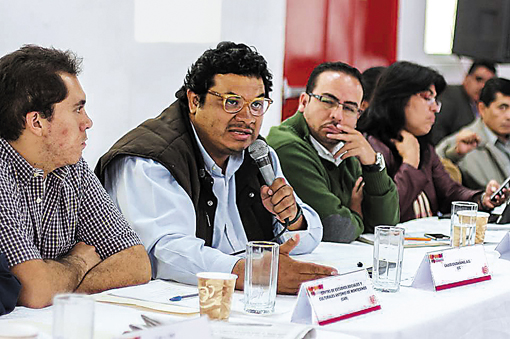Carlos Cruz knows how dangerous it is to investigate crime and violence in Mexico. Since joining the mass of organizations and individuals demanding answers for the September 2014 disappearance of 43 Mexican students in the state of Guerrero, Cruz and his organization, Cauce Ciudadano (Citizens’ Way)—a nonprofit that addresses youth violence—have been warned not to get involved.
This isn’t the first time Cruz, 41, has been threatened. In 2012, threats from what he says were anonymous government officials temporarily ended his efforts to verify the identities of Mexicans killed in the country’s drug war, and forced Cruz out of the country for six months. Cauce researchers had been investigating drug war-related killings to piece together victims’ identities. After trawling the Internet for a set of basic identifiers—age, name, hometown—Cauce researchers scoured the databases of government scholarship or social services programs for possible matches.
Not infrequently, Cauce’s findings about a victim’s identity contradicted the official version. In the case of 24-year-old gunshot victim Eduardo Fernández—officially identified as a member of the feared Los Zetas cartel—Cauce discovered that Fernández was a scholarship student at a local polytechnic school.
Cruz says his team documented 64 cases of false positives, which they planned to publish, until their computer and files were stolen from their offices in 2012. But Cruz now plans to restart his investigative work. “I think we are among the organizations with the most tools for documenting these cases,” he says.
Cruz spent most of his young adult life as a member of a street gang. When a friend and fellow gang member was killed in 2000, he decided to found Cauce in his home town of Mexico City. “We wanted a place to be at peace,” he says. “Almost immediately, it led to the question, ‘What does it mean to be at peace?’” Cruz began a long process of self-transformation and study to find out, emerging with the conviction that there is no single solution to a problem caused by many factors.
For 14 years, Cauce has put that lesson into action, conducting investigations as well as developing programs focusing on health and wellness, life skills, leadership, and career training—all aimed at giving young people a chance to pursue safer paths. Thanks in part to federal funding and private consulting fees, the nonprofit now operates eight community development centers in five Mexican states and the Federal District.
Cauce has also extended its work beyond at-risk youth. With the help of the global social entrepreneurship organization Ashoka, Cauce collaborated with Danone, a multinational food coorporation, to train and hire women in marginalized communities to sell yogurt products, providing them with income, training and access to formal employment. The organization is now seeking other corporate partners and investors for long-term projects, and is developing programs and services for corporate clients to work more effectively with the public to address problems such as robberies and violence. “We aren’t looking for philanthropy,” Cruz explains. “We think corporations should pay for results.”
The nonprofit has also provided human rights training to police officers and government officials who have direct control over programs that involve young people—such as culture and sports programs—creating what Cruz describes as a “critical mass” of government workers who can lead a change in approach.
True to Cruz’s conviction that there is no single answer to the issue of youth violence, Cauce recently submitted a draft law to the Mexico City government that would enumerate the rights of young people in the capital and outline mechanisms for fulfilling these rights. For example, upholding the right to work would require the government to support entrepreneurial activity for young adults. Cauce is currently in the process of lobbying and negotiating the law. “We need to acknowledge that young people aren’t dangerous,” Cruz says. “They are in danger.”




